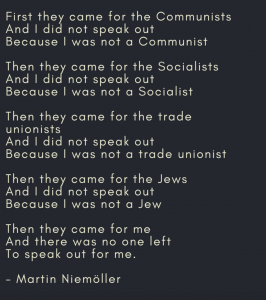First they came…
Posted on April 2, 2020 | By kdaniel24 | Leave a response

This is a theme I see in many stories of persecution, and, in extreme cases, genocide. Of course, we know this was a prominent issue in the allowing of the holocaust, but I’m sure this is a leading cause in many other atrocities. The fear to speak out is a strong one, and it is why we are now studying the range of human behavior. In my book, The Book Thief by Markus Zusak, we see a family that does help the Jews. This was a rare occurrence, and the reasons behind it are partially obligations from morals, and partially obligations on a promise made to the family of a deceased friend. Either way, it was an extremely courageous decision and, as we learned from the poem, a very hard one to make. There also was another part in the story where there was a decision that may not have been too significant in the help of the Jews, but it certainly was powerful symbolically. When the main character’s foster father witnesses men throwing rocks into a Jewish owned storefront, as the shopkeep is cleaning up, the man makes the brave and extremely illegal decision to offer to repaint the man’s door which displayed the yellow Jewish Star. This decision showed this character’s general compassion and moral obligation, even the face of punishment and the strict law. The poem helps one understand that apathy towards the perpetrator, and being the bystander is not morally just. The thought of “These people are being persecuted, but I am not one of them, so I need not speak out” is simply incorrect. In order to stop a machine of persecution, you must resist from the start, and continue to resist, or you may be the one being persecuted. You must be one of the few who risks their well being at the roots to stop the climbing up the pyramid of hate.
Recent Comments